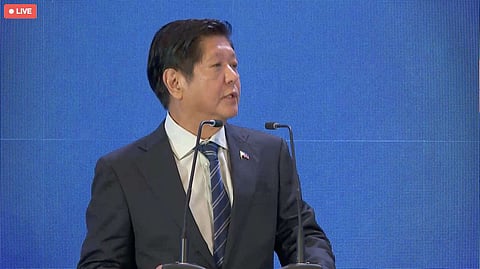
- NEWS
- the EDIT
- COMMENTARY
- BUSINESS
- LIFE
- SHOW
- ACTION
- GLOBAL GOALS
- SNAPS
- DYARYO TIRADA
- MORE

President Ferdinand Marcos Jr. on Wednesday said the Philippines cannot rely on imports to meet its food needs as he discussed the state of the Philippine economy post-Covid and his plans for the future.
During the 10th Asian Summit in Singapore, Marcos said the COVID-19 pandemic gave the country one of "the hardest lessons" as the lockdowns affected the global supply chains.
"There was no transportation going on. Everyone was locked down. We unfortunately had to suffer the longest lockdown, aside from China. And that went on for a good long while," Marcos acknowledged.
"But this was a lesson that we immediately learned, that we cannot now continue to depend on importation, which is what has happened in the Philippines," Marcos added.
Marcos, who concurrently heads the Department of Agriculture, underscored that the country needs to improve its agricultural sector and provide sufficient food supplies at prices that people can afford.
Marcos has ordered the imposition of price ceilings on regular and well-milled rice. The price cap for regular rice is P41 per kilo, and for well-milled rice, it is P45 per kilo. He said that this measure is only temporary and that rice imports will soon arrive.
He also blamed smugglers and hoarders for the increase in the prices of rice.
DA had earlier recommended importing 500,000 metric tons of rice to address the thin supply in the buffer stock.
Marcos also spoke about his plans to attract foreign investment into the Philippines. He said that the government has made changes to the rules and systems to make it easier for businesses to operate in the country.
"We have amended legislation so that the tax incentives, the tax holidays, the tariffs, et cetera, the tariff structures have all been changed so that it is easier for our foreign investors to come in and to do business," Marcos said.
Marcos explained that he met with economic managers and business leaders in Singapore to discuss ways to make the Philippines more investment-friendly.
Investors' top concerns were the country's power supply and the ease of doing business.
"The bureaucracy had gone a little bit out of control. That's something that we have immediately begun to address," he said, adding the Philippines is trying to increase its electricity supply.
Hence, he said the government is working to digitalize the bureaucracy to make it easier for businesses to interact with the government.
